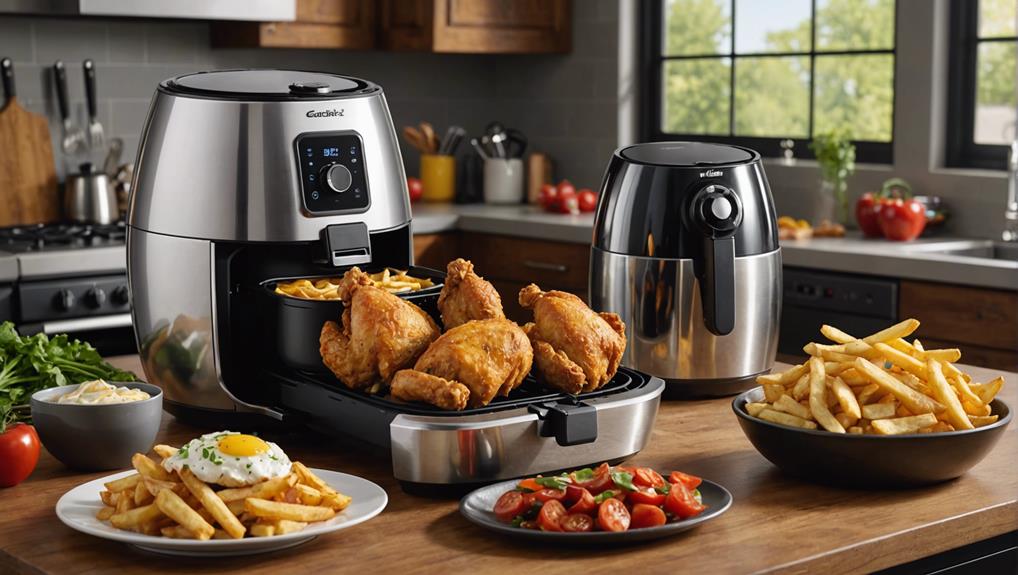Yes, air fryers are great for cooking low-fat meals. They use hot air to cook foods, requiring little to no oil, which cuts down on fat and calorie intake. This makes them an excellent option for weight management and supporting heart health. Air fryers also preserve essential nutrients and reduce harmful compounds like acrylamide, which can form during high-temperature cooking. Plus, they provide an efficient, convenient way to prepare crispy and delicious meals without the added fat of deep frying. If you want to explore all the benefits and considerations, there's more valuable information to discover.
Key Takeaways
- Air fryers significantly reduce fat and calorie intake by using minimal oil compared to traditional frying.
- They support weight management by enabling the preparation of low-fat, nutrient-dense meals.
- Air frying lowers the formation of harmful compounds like acrylamide, promoting better health.
- Even cooking and a crispy finish make air-fried foods appealing without the need for excess fat.
- Air fryers are convenient for quick, low-fat meal preparation, fitting easily into busy lifestyles.
What Is an Air Fryer?
An air fryer is a kitchen appliance that circulates hot air to cook food with much less oil than traditional frying methods. This method of cooking is not only convenient but also offers a healthier alternative to deep frying. By using an air fryer, you can prepare your favorite fried foods with up to 75% less fat, making it ideal for low-fat diets.
When you use an air fryer, you're opting for a cooking method that promotes lower calorie intake. Traditional frying methods can greatly increase the calorie and fat content of your meals, whereas air frying requires minimal oil—sometimes just a tablespoon. This reduction in oil usage translates to lower calorie meals, helping you manage your weight more effectively.
The air fryer's ability to create a crunchy exterior on foods like fries and chicken, while maintaining minimal fat content, makes it a game-changer for those seeking healthier eating habits. It's not just about reducing fat; it's about making delicious, nutrient-dense meals more accessible. So, if you're looking for a way to enjoy your favorite fried foods without the guilt, an air fryer is a convenient and healthier alternative.
How Air Fryers Work
When you use an air fryer, it cooks your food by circulating hot air around it, resulting in a crispy exterior without needing to submerge it in oil. This convection heating method is key to air frying's ability to create deliciously crunchy dishes with much less fat. By using just a minimal amount of oil, air fryers guarantee your food has that desirable fried texture while keeping the fat content low.
Air fryers work by rapidly moving hot air around the food, which not only cooks it evenly but also achieves a crispy finish. This method mimics the results of traditional deep frying but with up to 75-80% less fat. The circulating air ensures that every part of the food is exposed to consistent heat, reducing the need for excessive oil.
Compared to other cooking methods, air frying stands out for its efficiency in reducing oil consumption. This leads to healthier meals without sacrificing taste or texture. By incorporating air frying into your cooking routine, you can enjoy your favorite fried foods with a fraction of the fat, making it an excellent option for those looking to maintain a nutrient-dense, health-focused diet.
Benefits of Air Frying

Air frying greatly reduces fat content, making it a smart choice for preparing nutritious, low-fat meals. By cutting down fat content by up to 75%, air frying markedly lowers the calorie intake of your dishes, helping you stick to your weight management goals and promoting healthier eating habits. This means you can enjoy your favorite crispy dishes like chips and fried chicken without the guilt that typically accompanies deep-fried foods.
One of the standout health benefits of air frying is its ability to reduce acrylamide formation by up to 90%. Acrylamide is a potentially harmful compound that forms during high-temperature cooking, particularly in starchy foods. Lowering its formation reduces associated health risks, making air frying a safer option than traditional frying methods.
Additionally, air frying is not only safer but also more nutrient-preserving. The high-speed air circulation cooks food quickly and evenly, which helps maintain more of the essential nutrients compared to other cooking methods. This means you can enjoy meals that are not only lower in fat and calories but also rich in vitamins and minerals.
Air frying offers a convenient way to achieve healthier, low-fat meals without sacrificing flavor or texture.
Lower Fat Cooking
Embracing air fryers for lower fat cooking allows you to enjoy delicious meals with greatly reduced oil content, promoting healthier eating habits and supporting weight management. Air fryers require up to 75% less oil than traditional deep frying methods, making them a healthier option for preparing your favorite crispy foods. This significant reduction in oil not only lowers fat intake but also helps decrease the overall calorie content of your meals.
When you use an air fryer, you can achieve a crispy exterior and tender interior in your dishes without the excessive oil that deep frying entails. This means you can savor the texture and taste of traditionally fried foods, but with far less fat. The health benefits are clear: lower fat intake can lead to improved cardiovascular health and better weight management, both of which are essential for long-term wellness.
Moreover, the convenience and efficiency of air fryers make it easier to consistently prepare low-fat meals. This consistent practice can further promote healthier eating habits, helping you maintain a balanced diet without sacrificing flavor or satisfaction. Overall, air fryers are an excellent tool for anyone looking to cook lower fat meals.
Weight Management

Utilizing an air fryer can be a game-changer for weight management, as it greatly reduces fat and calorie intake without compromising on taste. By using an air fryer, you can cut the fat content in your meals by up to 75%, making it easier to stick to your weight management goals. Traditional frying methods often require substantial oil, but air frying uses minimal oil while still delivering crispy, delicious results. This means you can enjoy your favorite fried foods with notably fewer calories and less fat.
Cooking with an air fryer allows you to prepare low-fat meals that are nutrient-dense and satisfying. Foods like chips and fried chicken, typically high in fat, can be made healthier with an air fryer. This appliance helps you reduce the overall fat consumption in your diet, making it easier to manage your weight. The convenience of air frying also means you're more likely to cook at home, further supporting your weight management efforts.
Incorporating an air fryer into your routine can make a substantial difference in your calorie intake and overall health. By choosing air-fried options, you're making a commitment to healthier eating habits and effective weight management.
Reduced Acrylamide Levels
Switching to air frying can greatly reduce the formation of acrylamide in your meals by up to 90%, making your food choices decidedly healthier. Acrylamide is a potentially harmful compound that forms when starchy foods like potatoes are cooked at high temperatures, typically during frying, roasting, or baking. By choosing air frying over traditional deep frying, you can notably lower acrylamide levels in your meals.
Lower acrylamide levels contribute to a healthier meal option, as this compound is a known carcinogen. Research indicates that reduced formation of acrylamide through air frying may decrease the risk of certain health issues, including cancer. The ability to minimize exposure to this harmful substance can have long-term health benefits.
In addition to being a lower-risk cooking method, air frying doesn't compromise on taste or texture. You get the crispy, golden-brown finish you crave in starchy foods without the added health risks. So, if you're looking to make your diet healthier, opting for air-fried meals is a smart move. Not only are you cutting down on unhealthy fats, but you're also reducing your intake of potentially harmful acrylamides.
Kitchen Safety

Moreover, notably,
When you use an air fryer, you greatly reduce the risk of oil splatters and burns, making your kitchen a safer environment. Traditional deep frying often involves large amounts of hot oil, which can be hazardous. By opting for an air fryer, you eliminate these risks, providing a safer alternative for your cooking needs. This not only enhances kitchen safety but also supports low-fat cooking, which is beneficial for your overall health.
Air fryers allow you to prepare meals with notably less oil, aiding in lower calorie intake and supporting weight management goals. By reducing the amount of oil used, you're also cutting down on harmful saturated fats. Moreover, air frying can help reduce harmful compounds like acrylamide, which forms in certain foods during high-temperature cooking processes. This makes air fryers a health-focused option for those looking to reduce harmful compounds in their diet.
Additionally, air fryers offer convenient cooking solutions, allowing you to enjoy crispy, delicious meals without the added fats and risks associated with traditional frying methods. This combination of safety, health benefits, and convenience makes air fryers an excellent choice for those committed to a healthier lifestyle.
Nutrient Preservation
In addition to enhancing kitchen safety and supporting low-fat cooking, air fryers excel in nutrient preservation, guaranteeing that your meals retain their essential vitamins and minerals. The circulating hot air in air fryers cooks food evenly, which greatly reduces the loss of water-soluble vitamins like vitamin C. This method helps maintain nutrient retention compared to traditional frying methods.
Air fryers operate at lower temperatures and require shorter cooking times, which are vital factors in preserving the integrity of essential nutrients in your food. When you're preparing low-fat meals, these features help make sure that vegetables, meats, and other ingredients retain their full nutritional value. Research indicates that the nutrient retention in foods cooked with air fryers is comparable to other healthy cooking methods such as baking, grilling, and steaming.
Comparing Air Frying and Deep Frying

Air frying offers a noticeably healthier alternative to deep frying by drastically reducing oil usage and minimizing calorie intake. When you use an air fryer, you're markedly cutting down on fat content in your meals. This is because air frying requires only a fraction of the oil that deep frying does. Consequently, the food absorbs less oil, resulting in lower fat content and fewer calories per serving. This makes air frying an excellent cooking method if you're aiming to consume healthier, low-fat meals.
Moreover, deep frying not only increases the calorie count but also retains more inflammatory compounds due to the high oil content and cooking temperatures. In contrast, air frying uses hot air circulation to cook your food, which reduces these harmful compounds. Additionally, air-fried starchy foods like potatoes can have increased levels of slowly digestible starch, providing a more gradual release of energy.
Choosing an air fryer over deep frying isn't just about cutting calories. It's about opting for a healthier alternative that offers similar textures and flavors of fried foods without the downsides. So, when you're looking to enjoy your favorite fried foods with a lower fat content, an air fryer is a smart choice.
Is Air Frying for Everyone?
Not everyone may find air frying suitable for their dietary needs and preferences. While air frying is a healthy alternative to deep frying, it's not a one-size-fits-all solution. This cooking method uses up to 75% less fat, making it ideal for those looking to reduce fat content in their meals. If you aim for a balanced diet and want to enjoy quick low-fat meals, air frying can be a great option.
However, it's important to bear in mind that air frying should be a part of a varied and balanced diet. Relying solely on it might not provide all the nutrients you need. The convenience of reducing cooking time by half is appealing, but it doesn't replace the need for other cooking methods that might retain more vitamins and minerals.
For individuals with specific dietary restrictions or those who require higher fat intake for health reasons, air frying might not be the best fit. Similarly, if you prefer traditional cooking methods for texture and flavor, you might find air frying less satisfying.
Ultimately, air frying can be a valuable tool in your kitchen arsenal, especially for preparing lower-fat meals efficiently. But it's important to balance it with other cooking methods to guarantee a well-rounded diet.
Frequently Asked Questions
Is Air Fryer Good for Low Fat Diet?
Yes, an air fryer is great for a low-fat diet. It promotes calorie reduction, uses oil alternatives, retains nutrients, cooks quickly, aids portion control, offers meal variety, and preserves flavor. It's a healthier cooking option.
Are Air Fryers Good for Fat Loss?
Using an air fryer can cut calorie intake by up to 80%, making it great for fat loss. You'll enjoy reduced oils, portion control, and meal prepping benefits, while retaining nutrients and flavor—all with quicker cooking speed!
What Are the Negatives of Cooking in an Air Fryer?
When using an air fryer, you risk potential carcinogens from acrylamide, uneven cooking, nutrient loss, and limited capacity. Additionally, you might notice high noise levels, a plastic smell, and the high cost of quality models.
Are Air Fryers Good for a Healthy Diet?
You'll find air fryers support a healthy diet through nutrient retention, portion control, and cooking convenience. They offer easy cleanup, meal variety, and food crispiness while promoting significant calorie reduction, making them an excellent choice.
Conclusion
Incorporating an air fryer into your kitchen can greatly reduce your fat intake. For example, air frying can cut fat content by up to 75% compared to traditional deep frying. This shift not only supports weight management but also preserves essential nutrients in your meals. While air frying isn't for everyone, it's a safe and health-focused option for those aiming to enjoy nutrient-dense, lower-fat meals without compromising on taste.
Disclosure: As an Amazon Associate, I earn from qualifying purchases.



